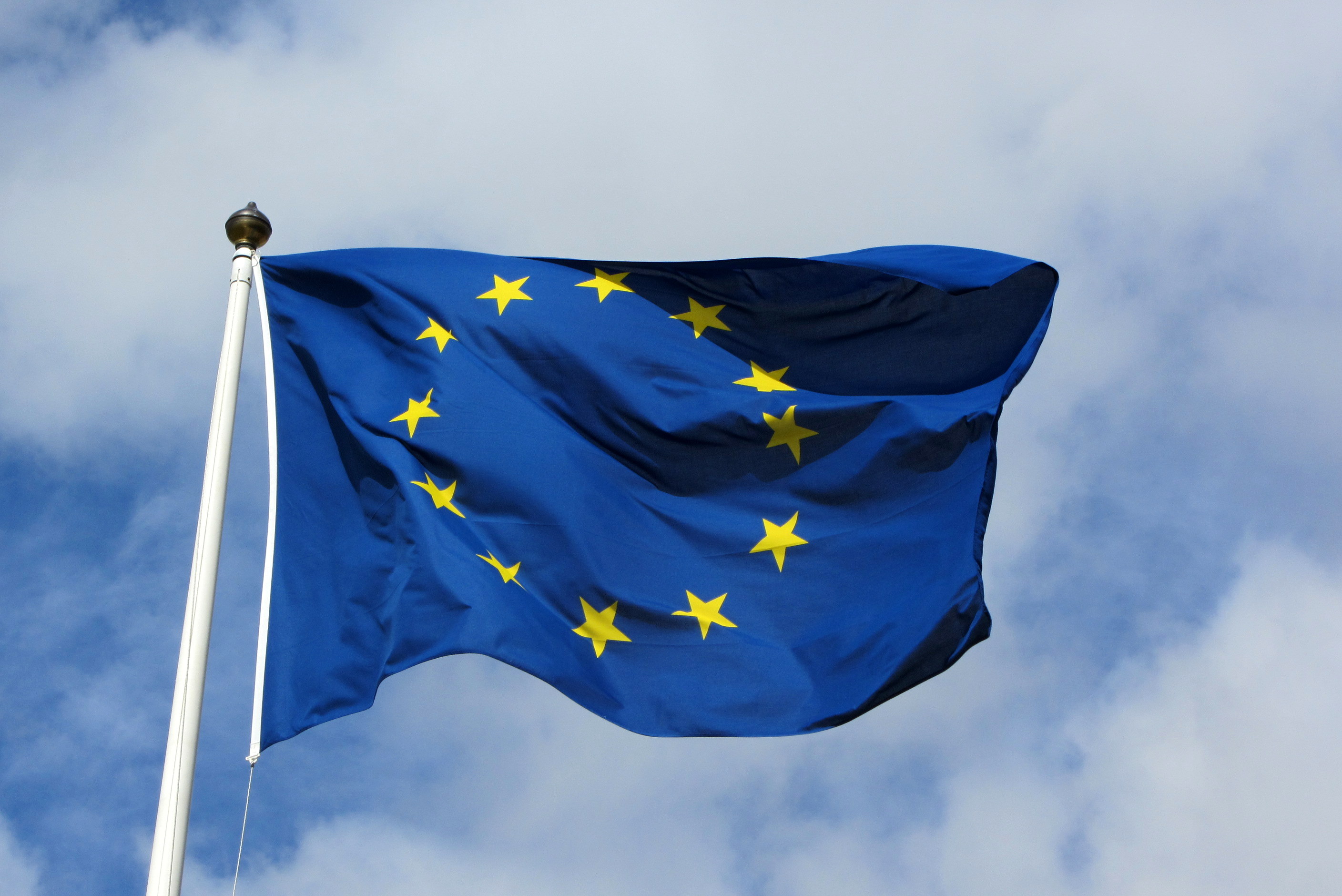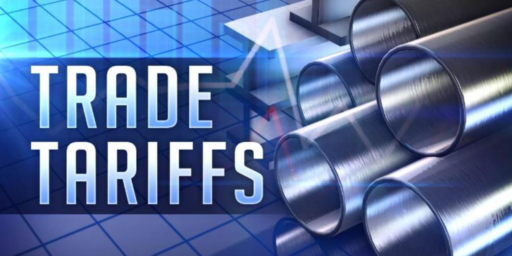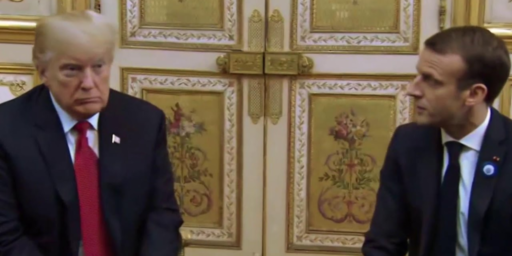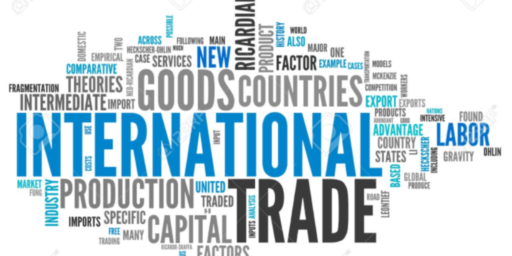The US, Russia, and the EU
The actions of the Trump administration are helping Russian-EU relations (to the detriment of the US).
 Via the NYT: Putin Moves to Capitalize on Europe’s Fury With Trump.
Via the NYT: Putin Moves to Capitalize on Europe’s Fury With Trump.
President Vladimir V. Putin of Russia arrived in Austria on Tuesday sensing an opportunity almost unimaginable just months ago: to overhaul frosty relations with a European Union infuriated by President Trump on a host of issues, from climate and Iran to, most recently, tariffs and trade.
Never mind that Mr. Putin was until recently virtually a pariah in Europe after his military interventions in Ukraine, Crimea and Syria; after meddling in European elections and working hard to foment right-wing populist uprisings throughout the Continent; after polluting the political environment with fake news; and after allegedly poisoning a former Russian spy and his daughter in Britain, charges Russia denies.
Mr. Putin was now gaining considerable traction by casting himself as a reliable friend and trading partner to Europe even as the Trump administration was treating its closest allies there as strategic and economic competitors.
[…]
Populist, Russophile parties are in power in Greece, Hungary, Italy and Austria. The prospect of attaining Mr. Putin’s immediate goal of throwing off economic sanctions imposed by the European Union over the last several years suddenly seemed within reach, even without compromise in Ukraine.
Indeed, in recent days, with the G-7 meeting of the world’s largest advanced economies looming, Mr. Trump has had unusually bad-tempered telephone calls on the tariff issue with both the French president, Emmanuel Macron, and the British prime minister, Theresa May.
The Germans and Canadians are furious about the tariffs, too. Washington justifies them even to its NATO allies on what they dismiss as the specious grounds of “national security.”
Regardless of one’s partisan leanings, one has to ask of what the benefit is of decreasing US influence with key trading partners, not to mention how it makes American great to increasing Russian-EU ties at the expense of the US.
The piece clearly details how pro-Russia parties in various countries are looking to deepen ties with that country at the same time that the US is isolating itself. Beyond that, even some of our closest allies, Germany and France, are looking to Moscow over the Iran deal:
Both Chancellor Angela Merkel of Germany and Mr. Macron visited Russia at the end of May to discuss salvaging the Iran deal. And Mr. Macron complained at a conference in St. Petersburg about the damage being done to world trade — clearly alluding to Mr. Trump.
Mr. Macron, the guest of honor, was particularly effusive in evoking the cultural and historical links that tie Russia to the rest of Europe.
Ms. Merkel, who has few illusions about Mr. Putin and has been vital to maintaining economic sanctions against Russia, also finds herself and her country a particular target of Mr. Trump. In addition to the tariffs on steel and aluminum, which Germany can live with, he is now threatening unilateral tariffs on imported cars, which it cannot.
This is an illustration of why foreign policy is not a simplistic zero-sum game, especially complex agreements like the JCPOA. The US withdrawal did not just affect Iran, but is relevant to all the parties to the deal. By withdrawing from that agreement, Trump has diminished US influence. What he touts as strength leads to weakness–and enhances Russian influence.
And look: I am not one who thinks that Russia is great bogeyman. I see them as a global rival who may veer into the adversary lane. I certainly see a place for a constructive, but wary, relationship between the US and Russia. But one think is for certain: Russia is not a friend and ally of the US. Moreover, Russia is not a friend to liberal democracy. As such, expanded Russian influence, especially at the expense of that of the US, is problematic–especially if it helps the right-wing populist parties we are seeing gain strength in places like Italy.
Even setting aside Russia, the following situation is not in the interests of the US:
These tensions will be on display this weekend at the G-7 meeting in Canada. That normally American-dominated meeting is likely to see Mr. Trump isolated on the issue of trade, six against one.
Such internal divisions probably amuse Mr. Putin, who saw Russia “suspended” from what was the G-8 after the annexation of Crimea, but who now sees a far more welcoming landscape in Europe.
In fact, the French Finance Minister used the phrase “G6 plus one.” This is not a positive development.
Via CNN:
Top officials from the Group of Seven — Canada, France, Germany, Italy, Japan and the United Kingdom — asked US Treasury Secretary Steven Mnuchin to convey their “unanimous concern and disappointment” to the US president, suggesting his recent trade actions could incite uncertainty, dampening the goal of economic growth.
[…]
“We will be divided — it will not a G-7, it will be a G-6 plus one,” French Finance Minister Bruno Le Maire said in a Bloomberg Television interview. “It is dangerous for growth, dangerous for the economic development of the world, and dangerous for our jobs in the EU.”
This is all especially vexing because the ostensible reason for new tariffs was Chinese behavior, but instead it is creating consternation with long-term allies. Further, focusing on steel is an antiquated, 1950s-centric, view of global economic power. And, in truth, Trump does not appear have a real plan or understanding guiding these problematic, damaging policies. Rather, he has a caricature of a plan (a mix of steel and coal nostalgia and an elementary school level, to be kind, understanding of global economics).





I don’t think that Russia is our friend. At this point I don’t even think they might become friendly to the U. S. I think we can work together in areas of mutual interest where our national interests don’t conflict. We’re a global power and Russia is a regional power so that there will be both sorts of areas is inevitable.
And we can certainly defuse the present tension somewhat. Not putting a military base in Poland would be a good start.
One last point. The Russians and Chinese are natural adversaries. Don’t expect them to link arms against us any time soon on anything but a very temporary basis. We could push them together but they won’t do it on their own.
I think it’s an open question at this point as to whether the Europeans including our NATO allies are our friends. IMO they’re too accustomed to our being a piggy bank for them.
Isn’t the saying something like “countries don’t have friends, they have interests?”
In this case, Trump’s interests are different from the EU’s; so of course the EU is going to look for others closer to their interests on these issues. On other issues they’ll unite with America.
@george:
Therein lies the issue: to what degree are “Trump’s interests” in line with broader US interests.
I get that he is the president and sets foreign policy. However, that does not obviate the fact that he is making choices that do not appear to be constructive in terms of US interests, especially in terms of global leadership and influence.
Rhetorical question, I trust. Only coincidentally. With the exception of James Buchanan, has any past president ever inspired that question?
Meanwhile:
‘Iran has launched a plan to increase its uranium enrichment capacity with new centrifuges, raising the pressure on European diplomats scrambling to rescue the crumbling nuclear deal after the US pulled out.’
https://www.theguardian.com…
This quote informs the Trumpian mind, such as it is, that it is indeed winning. If the EU loses jobs, then inevitably somehow they will materialize in rural America!
@Steven L. Taylor:
I completely agree. I was just pointing out that the issue is interests, not friendships.
In Trump’s case, I don’t think he cares one way or another whether America’s interests coincide with his.
@george: Well, sure. But by the same token, we clearly have a much deeper set of shared interests, bordering on as close to “friendship” in an IR sense as one can get, with the other member of the G7 than we do with a lot of other states. If one is going F that up, one ought to have a good reason.
(Or, more to the point, if one is a Trump supporter one needs to really understand what one is supporting).
@Steven L. Taylor: I take it that “those stupid Europeans liked Obama more than they like ME” isn’t a valid enough reason for you?
Well hell, it is often the case that he acts like he himself doesn’t know what he is supporting…